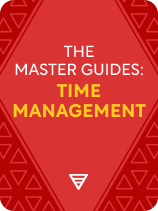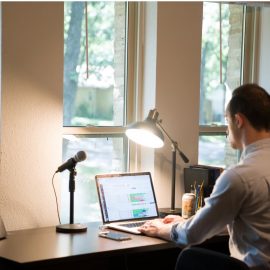

This article is an excerpt from the Shortform book guide to "The Master Guides: Time Management" by Shortform. Shortform has the world's best summaries and analyses of books you should be reading.
Like this article? Sign up for a free trial here.
Do you struggle to stay focused on your tasks? Are you looking for effective strategies to combat procrastination and boost productivity?
Learning how to stay on task is crucial in today’s world of constant distractions. We’ll review various techniques to manage external interruptions and overcome internal emotional hurdles that lead to procrastination.
Keep reading to discover ways to transform your relationship with time and make it work for you.
Staying on Task
Once you plan out your schedule and start regularly tracking your time, you may become acutely aware of all of the forces trying to derail your plans. It takes practice and a conscious act of will to stick to your schedule and avoid distractions, whether they’re external (such as phone notifications) or internal (such as procrastination). We’ll address how to stay on task, dealing with the easy part first—external distractions. Then we’ll tackle the more difficult emotional hurdles that trigger procrastination. If you can overcome your emotional roadblocks, you can make time work for you rather than be something you have to fight against.
Digital Distractions
The barrage of modern media is so overwhelming that it takes more than sheer strength of will to keep it at bay. In Make Time, tech industry insiders Jake Knapp and John Zeratzky assert that you have to deliberately put barriers in place to keep your devices from stealing your time. The single most pernicious device that impinges on your schedule is your smartphone. Knapp and Zeratsky recommend that you delete all social media apps, games, and even your email from your phone. If that’s too extreme, they suggest you turn off all notifications and remove the apps from your homescreen, forcing you to choose when to use each app.
In the workplace, the other main external distractor is email, which many of us feel obliged to respond to, even if it isn’t important and we have to drop whatever we’re doing so we can reply to a message. Knapp and Zeratsky offer several strategies to take control of your email time, such as only responding to email at the end of the day, or maybe according to an email schedule in which you only check it two or three times per day. (This can be especially useful if you communicate with people in various time zones.) Whatever you do, you should budget email time in your schedule, using apps to lock you out if you have to.
Procrastination
Unfortunately, there isn’t an app that can easily stop you from procrastinating. In The Procrastination Cure, Damon Zahariades says procrastination is to delay action on something that’s in your best interest to do now. Most reasons for procrastination are rooted in the fact that your brain prefers immediate rewards to delayed gratification. Put another way, procrastination is a conflict between the interests of Present You and Future You. Present You wants to have fun, even if it makes life hard for Future You. The more difficult and complex a task is, the greater the incentive your brain needs to do it. Meanwhile, the future’s uncertainty makes thinking about your future’s best interests anxiety-inducing and something to avoid.
Therefore, Zahariades suggests that the emotional culprit behind most procrastination is fear. Your fear can take many forms, such as fear of failure or fear of success: When a task involves something you don’t believe you’re good at, you’ll naturally want to avoid it. Conversely, you’ll also avoid doing a task if you’re nervous about what might happen if you do it well, such as increasing your workload or putting yourself under more scrutiny. Zahariades suggests shifting your perspective or using logic to expose your fears as irrational. Reframe failure as a chance to learn, evaluate how realistic your fears are, and consider the outcomes of procrastination, such as feeling overwhelmed later while you’re scrambling to meet deadlines.
In The Now Habit, Neil Fiore recommends that you change your relationship with work and leisure time. First of all, you should change your self-talk. Procrastinators typically talk to themselves in “have to” and “should” statements—both of which build negative feelings that lead to procrastination. Fiore says that you can shift your self-talk to emphasize personal choice—for instance, instead of saying you “have to” or “should” do something, tell yourself you “choose to” or “want to” do that thing. This kind of reframing removes unnecessary stress and judgment from your self-talk and puts the emphasis on your desires and your freedom to choose.
Making Time Flow
Fiore argues that you can avoid procrastination if you design your schedule so you can enter a state of flow—a feeling of enhanced calm, concentration, and creativity. Fiore suggests that you can enter a flow state by performing focusing and relaxation exercises, which combine deep breathing, mindfulness, and affirmations. The concept of flow, first coined by psychologist Mihaly Csikszentmihalyi, is a frame of mind in which you become so engrossed in what you’re doing that you enter a state of optimal creativity. Managing time is no longer an issue—you may even lose the sense that time is passing. When you enter a state of flow, you experience true enjoyment, control over your feelings, and a greater sense of purpose and meaning.
Although you’ll probably feel relaxed when experiencing flow, Csikszentmihalyi found that people experience flow when they deal with challenges that engage an above-average number of their skills. He also found that the more regularly a person is in flow, the more likely they’ll describe feeling active, creative, and motivated. Unfortunately, it might not always be possible to enter a flow state on demand. Csikszentmihalyi says that in some cases, you might need to change jobs in order to find work that triggers flow for you.

———End of Preview———
Like what you just read? Read the rest of the world's best book summary and analysis of Shortform's "The Master Guides: Time Management" at Shortform.
Here's what you'll find in our full The Master Guides: Time Management summary:
- Experts’ advice for prioritizing what you spend your time on
- How to use bullet journals to track your time
- The emotional culprit behind procrastination






